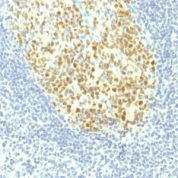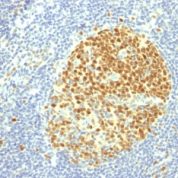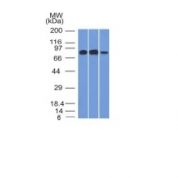Human Anti-MCM7 Antibody Product Attributes
Species: Human
Tested Applications: Immunohistochemistry (IHC). Additionally, this antibody has been validated by MS-QAVAâ¢. Specificity has been quantitatively determined via Mass Spec.
Clonality: Monoclonal
Anti-MCM7 Antibody Clone: MCM7/1468
Clone MCM7/1468 Host and Isotype: Mouse IgG2b
Anti-Human MCM7 Positive Control Sample: Raji or Ramos cells. Tonsil
Cellular Localization of Antibody Nuclear
Buffer and Stabilizer: 10mM PBS with 0.05% BSA and 0.05% Azide
Antibody Concentration: 200 ug/ml
Antibody Purification Method:Protein A/G Purified
Immunogen: Recombinant human MCM7 protein fragment (aa195-319)
Storage Conditions: Store at 2 to 8° C (refrigerate). Stable for 24 months when properly stored.
MCM7 Previously Observed Antibody Staining Patterns
Observed Subcellular, Organelle Specific Staining Data:
Variations in MCM7 antibody staining intensity in immunohistochemistry on tissue sections are present across different anatomical locations. An intense signal was observed in cells in the seminiferous ducts in testis, epidermal cells in the skin, germinal center cells in the lymph node and tonsil, glandular cells in the appendix, colon, duodenum, rectum and stomach, hematopoietic cells in the bone marrow, non-germinal center cells in the lymph node, squamous epithelial cells in the esophagus, oral mucosa, tonsil and vagina and trophoblastic cells in the placenta. More moderate antibody staining intensity was present in cells in the seminiferous ducts in testis, epidermal cells in the skin, germinal center cells in the lymph node and tonsil, glandular cells in the appendix, colon, duodenum, rectum and stomach, hematopoietic cells in the bone marrow, non-germinal center cells in the lymph node, squamous epithelial cells in the esophagus, oral mucosa, tonsil and vagina and trophoblastic cells in the placenta. Low, but measureable presence of MCM7 could be seen infollicle cells in the ovary, glandular cells in the adrenal gland, endometrium, fallopian tube, parathyroid gland and salivary gland, Leydig cells in the testis, ovarian stroma cells in the ovary, respiratory epithelial cells in the bronchus and urothelial cells in the urinary bladder. We were unable to detect MCM7 in other tissues. Disease states, inflammation, and other physiological changes can have a substantial impact on antibody staining patterns. These measurements were all taken in tissues deemed normal or from patients without known disease.Observed Antibody Staining Data By Tissue Type:
Tissues from cancer patients, for instance, have their own distinct pattern of MCM7 expression as measured by anti-MCM7 antibody immunohistochemical staining. The average level of expression by tumor is summarized in the table below. The variability row represents patient to patient variability in IHC staining.| Sample Type | breast cancer | carcinoid | cervical cancer | colorectal cancer | endometrial cancer | glioma | head and neck cancer | liver cancer | lung cancer | lymphoma | melanoma | ovarian cancer | pancreatic cancer | prostate cancer | renal cancer | skin cancer | stomach cancer | testicular cancer | thyroid cancer | urothelial cancer |
|---|---|---|---|---|---|---|---|---|---|---|---|---|---|---|---|---|---|---|---|---|
| Signal Intensity | +++ | ++ | +++ | +++ | ++ | ++ | ++ | + | ++ | +++ | +++ | +++ | +++ | + | + | +++ | ++ | +++ | ++ | ++ |
| MCM7 Variability | ++ | +++ | + | ++ | ++ | ++ | ++ | ++ | ++ | ++ | ++ | ++ | ++ | ++ | ++ | ++ | ++ | + | ++ | +++ |
Limitations and Warranty
This product is for Research Use Only. This antibody is guaranteed to work for a period of two years when properly stored.

![MCM7 Antibody Mass Spec Validation Data Analysis of Mass Spec data (dashed-line) of fractions stained with MCM7 MS-QAVA™ monoclonal antibody [Clone: MCM7/1468] (solid-line), reveals that less than 3.8% of signal is attributable to non-specific binding of anti-MCM7 [Clone: MCM7/1468] to targets other than MCM7 protein. Even frequently cited antibodies have much greater non-specific interactions, averaging over 30%. Data in image is from analysis in A431, RT4 and MCF7 cells.](https://cdn-enquirebio.pressidium.com/wp-content/uploads/2017/10/enQuire-Bio-4176-MSM3-P0-anti-MCM7-antibody.png)




![Analysis of Mass Spec data (dashed-line) of fractions stained with MCM7 MS-QAVA™ monoclonal antibody [Clone: MCM7/1468] (solid-line), reveals that less than 3.8% of signal is attributable to non-specific binding of anti-MCM7 [Clone: MCM7/1468] to targets other than MCM7 protein. Even frequently cited antibodies have much greater non-specific interactions, averaging over 30%. Data in image is from analysis in A431, RT4 and MCF7 cells.](https://cdn-enquirebio.pressidium.com/wp-content/uploads/2017/10/enQuire-Bio-4176-MSM3-P0-anti-MCM7-antibody-178x178.png)


There are no reviews yet.